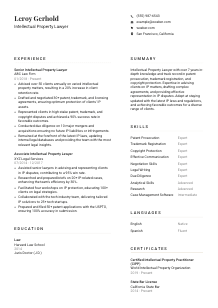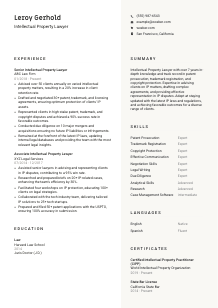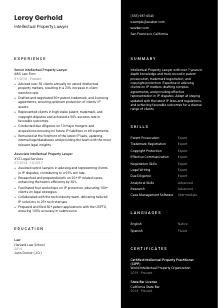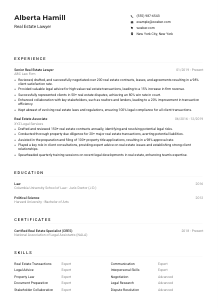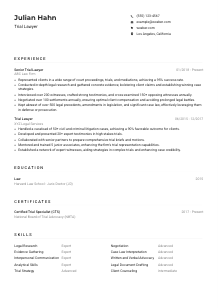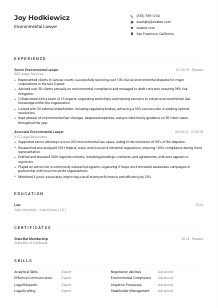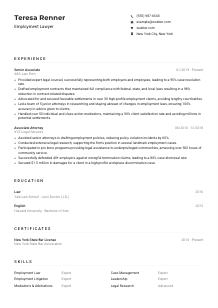Intellectual Property Lawyer Resume Example
Guarding innovations, but your resume seems not to patent your prowess? Delve into this Intellectual Property Lawyer resume example, shaped using Wozber free resume builder. Learn how to craft your legal brilliance to meet job criteria, ensuring your professional journey is always trademarked for success!
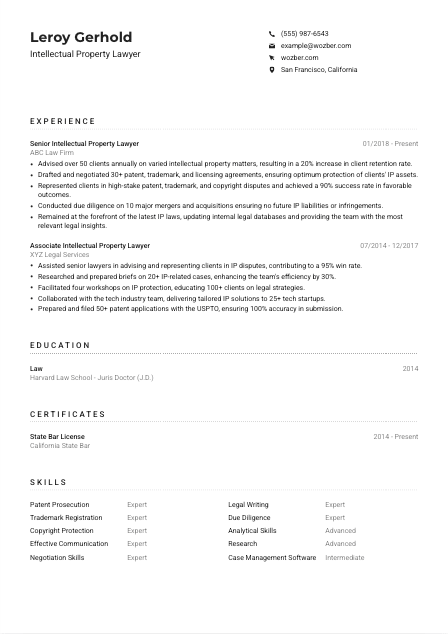
How to write an Intellectual Property Lawyer Resume?
Embarking on the journey to land your dream Intellectual Property Lawyer position is an adventure that begins with one crucial tool: your resume. As the legal landscape becomes increasingly complex, so does the art of capturing your capabilities on paper. Utilizing Wozber's free resume builder, this guide is meticulously crafted to steer you through the process of aligning your resume with the specific nuances of your desired role. Let's sculpt your legal expertise into an ATS-compliant resume narrative that not only matches but exceeds the expectations of your future employer.
Personal Details
The Personal Details section is akin to the first handshake: it's your introduction to the hiring team. For Intellectual Property Lawyers, making an impeccable first impression is non-negotiable. Here's how to fine-tune this section to resonate with the nuances of your profession, ensuring accuracy and perfect alignment with your role aspirations.
1. Name as Your Brand
Your name is more than just a label; it's the cornerstone of your professional identity. Ensure it stands out by using a clear, professional font. Consider bolding your name or opting for a slightly larger font size to make it memorable.
2. Job Title Precision
Positioning the title 'Intellectual Property Lawyer' directly under your name instantly signals your area of expertise to the hiring manager. It's a strategic move that aligns you with the role right from the start.
3. Essential Contact Details
Include your phone number and a professional email address. Remember, consistency is key across all your professional platforms, so ensure your email follows a simple format like firstname.lastname@email.com to maintain a polished image.
4. Location Strategy
"San Francisco, California" isn't just an address; it's an assurance. By listing this, you're meeting one of the job's logistical requirements upfront, signaling to employers your readiness and eliminating any concerns regarding relocation.
5. Professional Online Presence
A LinkedIn profile or a personal website dedicated to your professional achievements can be a powerful tool. Ensure these are up-to-date and reflective of your resume to provide a comprehensive view of your professional landscape.
Takeaway
With an ATS-friendly resume format, this section is more than mere formalities; it sets the stage for the narrative of your professional journey. Craft it with care, precision, and an eye towards alignment with your desired role. Your personal details are not just the start of your resume; they're the beginning of your next career milestone.





Experience
The Experience section is where your career story shines. This is your moment to illustrate not just your capabilities, but how those capabilities have propelled your career forward. For an Intellectual Property Lawyer, each bullet point is a testament to your expertise and a direct line to your next role.
- Advised over 50 clients annually on varied intellectual property matters, resulting in a 20% increase in client retention rate.
- Drafted and negotiated 30+ patent, trademark, and licensing agreements, ensuring optimum protection of clients' IP assets.
- Represented clients in high‑stake patent, trademark, and copyright disputes and achieved a 90% success rate in favorable outcomes.
- Conducted due diligence on 10 major mergers and acquisitions ensuring no future IP liabilities or infringements.
- Remained at the forefront of the latest IP laws, updating internal legal databases and providing the team with the most relevant legal insights.
- Assisted senior lawyers in advising and representing clients in IP disputes, contributing to a 95% win rate.
- Researched and prepared briefs on 20+ IP‑related cases, enhancing the team's efficiency by 30%.
- Facilitated four workshops on IP protection, educating 100+ clients on legal strategies.
- Collaborated with the tech industry team, delivering tailored IP solutions to 25+ tech startups.
- Prepared and filed 50+ patent applications with the USPTO, ensuring 100% accuracy in submission.
1. Dissecting the Job Description
Begin with a thorough analysis of the job requirements. Look for keywords such as 'patent prosecution', 'trademark registration', and 'copyright disputes'. These are the skills and experiences you want to highlight in this section.
2. Structuring Your Professional Journey
Chronology matters. Start with your most recent position, ensuring that each role before then builds upon the last. List your job title, the name of the firm, and your tenure, creating a clear path through your professional growth.
3. Crafting Accomplishment Statements
"Advised over 50 clients annually on varied intellectual property matters" not only encapsulates your role but quantifies your impact. Tailor each bullet point to reflect both your duties and your achievements, mirroring the job description.
4. Quantify Where You Can
Quantification provides context. Whether it's the number of cases you've won, the percentage increase in client retention, or the number of patents filed, numbers tell a compelling story of your contributions and successes.
5. Relevance Above All
Every piece of your experience should thread back to intellectual property law. Extraneous information, however interesting, can distract from the narrative you're building. Focus on what makes you an exceptional candidate for this specific role.
Takeaway
Think of the Experience section as your career highlight reel, strategically crafted to catch the eye of the hiring manager. By aligning your achievements with the job requirements, using an ATS-friendly resume template, and quantifying your impact, you're not just saying you're the right fit for the role—you're proving it. Let your experiences argue your case convincingly.
Education
The foundation of your career, your education section, underscores your technical knowledge and commitment to your craft. For an Intellectual Property Lawyer, this section is a testament to the rigorous academic training that has equipped you for the intricacies of the field.
1. Highlighting Key Requirements
"Juris Doctor (J.D.) from an accredited law school" should be prominently displayed, alongside your active membership in a state bar. These are non-negotiables for the role, and displaying them clearly meets the core educational criteria head-on.
2. Structure for Clarity
Keep this section straightforward and streamlined. List your degree, the institution, and your graduation year in a simple, easy-to-scan format. This isn't the place for over-elaboration; clear and concise is the goal.
3. Tailor to the Role
If your degree specialization, coursework, or academic achievements have direct relevance to intellectual property law, this is the place to highlight them. Demonstrating such specificity shows a deliberate and focused pursuit of your chosen field.
4. Relevant Courses and Achievements
For those earlier in their careers or where specific expertise is relevant, listing pertinent courses, academic projects, or honors can bolster your credentials, especially if they align closely with the requirements of the Intellectual Property Lawyer position.
5. Graduate and Continuing Education
If you've pursued additional legal certifications or courses post-graduation that enhance your expertise in intellectual property law, include these. Continuous learning shows a commitment to staying at the forefront of legal developments.
Takeaway
Your education section is a mirror of your academic dedication and a bulwark of your professional qualifications. By employing an ATS-friendly resume format to present this information clearly, you're not just listing your degrees; you're showcasing the bedrock of your legal expertise. Ensure it reflects the stature of your qualifications and positions you as a prime candidate for the role.
Certificates
In the realm of law, certifications can underscore your specialized knowledge and ongoing dedication to your field. For an Intellectual Property Lawyer, they're indicative of your commitment to continued professional development and your prowess in specific areas of the intellectual property landscape.
1. Identify Pertinent Certifications
While the job description might not specify required certifications, including relevant ones such as 'Certified Intellectual Property Practitioner (CIPP)' can significantly bolster your credentials.
2. Strategic Selection
Choose certifications that directly enhance your candidacy for the Intellectual Property Lawyer role. Each listed certification should serve to underline your expertise and specialized knowledge in intellectual property law.
3. Transparency and Timeliness
For certifications with expiry dates or those recently acquired, including the date frames helps maintain transparency about your current qualifications. It shows an ongoing commitment to keeping your skills sharp and up-to-date.
4. Continuous Learning
The legal field is perpetually changing, and intellectual property law is no exception. Emphasize your commitment to staying abreast of legal advancements by actively pursuing relevant certifications. This demonstrates not only your dedication but your adaptability and foresight in navigating the legal landscape.
Takeaway
Your certifications are emblematic of your specialized skills and dedication to excellence in your field. When employing Wozber's free resume builder and its ATS resume scanner for keyword optimization, ensure that your certifications are not only visible but are also in alignment with what recruiters in the intellectual property law domain are seeking. Let your certifications speak volumes of your commitment to the craft and your readiness to take on the challenges of the role.
Skills
The Skills section offers a succinct overview of your professional capabilities. For an Intellectual Property Lawyer, this is where your technical proficiencies and soft skills merge to paint a comprehensive picture of your legal finesse.
1. Unpacking the Job Description
Begin by identifying both explicit and implicit skill requirements in the job description. Skills such as 'patent prosecution', 'trademark registration', and 'analytical skills' are your keywords here.
2. Tailored Skill Listing
Prioritize skills that you excel in and that directly align with the job requirements. This ensures that your skills section is poignant, focused, and wholly pertinent to the Intellectual Property Lawyer role you're aspiring to.
3. Organization and Impact
While it may be tempting to list every skill you possess, restraint is key. Focus on impactful skills that distinguish you as a prime candidate for the position. An ATS-friendly resume format helps ensure these skills are easily identifiable.
Takeaway
Consider your Skills section as a curated gallery of your most compelling professional attributes. When leveraged with Wozber's free resume builder for ATS optimization, your skills don't just list your competencies; they narrate your story of legal expertise. Approach this section as an opportunity to impress and persuade, highlighting why you're an unmatched fit for the Intellectual Property Lawyer role.
Languages
In a profession where language plays a central role in negotiation, documentation, and litigation, your linguistic capabilities can significantly enhance your profile. The Languages section should not only reflect your proficiency but also your ability to engage effectively in diverse legal settings.
1. Job Requirements Analysis
The job description emphasizes a proficiency in English language communication. Ensure this is prominently featured at the top of your Languages section, indicating your level of fluency.
2. Highlighting Essential Languages
While English is paramount, the inclusion of additional languages showcases versatility. If you're fluent in Spanish, as is indicated in the resume example, list it to demonstrate your ability to navigate multi-lingual environments.
3. Comprehensive Language List
Beyond the languages explicitly mentioned in the job description, consider including others you're proficient in. This can be particularly advantageous if the role involves international legal proceedings or documentation.
4. Honest Representation
Clarity about your linguistic capabilities is crucial. From 'Native' to 'Basic', clearly delineating your fluency level ensures a transparent and honest representation of your skills.
5. Understanding the Role's Scope
For positions with an international focus, multi-lingual skills can be a significant asset. While not explicitly mentioned for the Intellectual Property Lawyer role, consider how your linguistic abilities can further bolster your candidature in a global legal landscape.
Takeaway
Your aptitude for languages is a testament to your ability to connect in a multifaceted legal world. As you compile your resume using Wozber's ATS-friendly resume templates, consider how each language you speak opens doors to new opportunities and enriches your professional narrative. Your linguistic skills not only complement your legal expertise but also elevate your role as a communicator in the legal domain.
Summary
The Summary section is where you distill your professional essence into a concise and compelling narrative. For an aspiring Intellectual Property Lawyer, this introductory narrative sets the tone for the dynamism and depth of your legal expertise.
1. Digesting Job Essentials
Kickstart your summary by internalizing the job description. Identify the core skills and experiences sought after, such as 'in-depth knowledge in patent prosecution, trademark registration, and copyright protection'.
2. Crafting a Captivating Introduction
Begin with a strong opening statement that encapsulates your professional stance and experience. For example, positioning yourself as an 'Intellectual Property Lawyer with over 7 years in-depth knowledge and track record' immediately affirms your expertise and experience.
3. Echoing Key Requirements
Highlight your proficiency in the critical areas mentioned in the job listing, underscoring your legal writing skills, effective communication, and negotiation prowess. Each point should serve to further cement your candidacy as the ideal match for the role.
4. Conciseness and Clarity
Keep your summary to 3-5 sentences, ensuring it's a potent blend of your most significant achievements and skills. This isn't about providing a comprehensive career history but rather a snapshot of your most compelling attributes.
Takeaway
Your Summary is your resume's opening argument; make it compelling and concise. Utilize Wozber's free resume builder to ensure your summary is not only ATS-optimized but perfectly tailored to the Intellectual Property Lawyer role you're pursuing. Let your summary intrigue and assure hiring managers that you are indeed the legal luminary they seek.
Launching Your Intellectual Property Lawyer Journey
Congratulations on meticulously tailoring your resume to meet the expectations of an Intellectual Property Lawyer role. With every section crafted with precision and aligned with the role's requirements, you're well on your way to securing your place within the legal domain. Remember, your resume is your advocate — designed to argue your case and highlight your professional prowess.
Wozber's free resume builder, with its ATS-friendly resume template and ATS resume scanner, is your partner in this journey, ensuring your resume not only attracts attention but keeps it. Go ahead, make your legal mark!

- Juris Doctor (J.D.) from an accredited law school and active membership in a state bar.
- Minimum of 5 years of experience practicing intellectual property law.
- In-depth understanding and proven track record in patent prosecution, trademark registration, and copyright protection.
- Strong analytical, research, and writing skills with particular emphasis on legal writing.
- Effective communication and negotiation skills to interact with clients, colleagues, and government agencies.
- Must be adept at English language communication.
- Must be located in or willing to relocate to San Francisco, California.
- Advise clients on intellectual property matters, including patent, trademark, and copyright issues.
- Draft, review, and negotiate patent, trademark, and licensing agreements.
- Represent clients in patent, trademark, and copyright disputes and litigation.
- Conduct due diligence on intellectual property assets during mergers, acquisitions, and licensing deals.
- Stay updated with the latest laws and regulations in intellectual property rights to provide clients with the most current legal advice.





